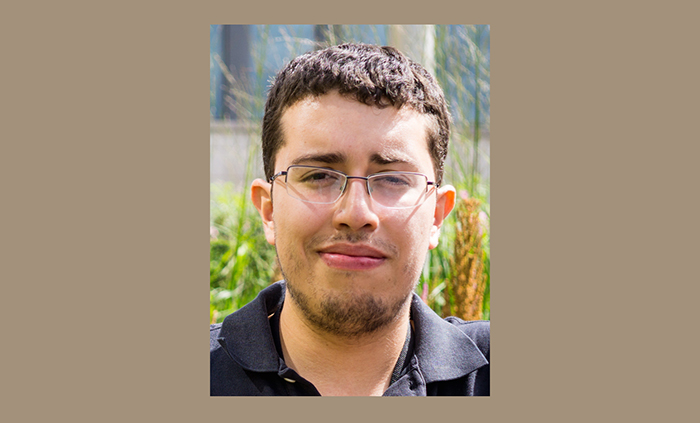We’re taking time over the following weeks to get to know the members of the GSA’s Early Career Scientist Committees. Join us every week to learn more about our early career scientist advocates.

Angel Fernando Cisneros Caballero
Communication and Outreach Subcommittee
Université Laval
Research Interest
A long-standing question in biology is how evolutionary processes lead to the appearance of new traits and functions in living beings. Decades of research have shown that differences between individuals and species arise from differences in their DNA sequence, so the evolution of DNA sequences plays a key role in the development of novel traits. Gene duplication is a widely studied process in genome evolution, and it can happen either on a small scale or on a genome-wide scale. For example, when a protein-coding gene is duplicated, a new protein is introduced in the cell; this protein can introduce redundancy, diverge to develop new functions, or—in some cases—introduce a dependence between the two proteins, as shown by our lab.
I am currently working on the case where the protein encoded by the duplicated gene interacts with itself. In such a case, the new protein will also interact with itself, but a hybrid complex that involves both the new protein and the old one will also appear because the two proteins will be identical. The appearance of this hybrid is important because the new protein could become an inhibitor of the original one, thus developing new regulatory mechanisms, or new kinds of protein complexes could appear that introduce new functions. Hybrid complexes are kept in some cases and disfavored in others, but we do not know what determines the outcome. As such, my research aims to study how protein sequences evolve to either favor or disfavor the hybrid protein complexes that can arise following gene duplication under different selective conditions. I use a computational analysis that combines protein structures retrieved from public databases, fitness functions based on protein stability and the favorability of complex formation, and a framework for the simulation of protein sequence evolution.
As a PhD-trained scientist, you have many career options. What career paths interest you the most?
My goal is to keep contributing to the development of science and society—especially in the rapidly changing and highly exciting fields of bioinformatics and computational biology—both by applying existing tools to novel questions and by developing new tools. I aim to lead an interdisciplinary research team, as such teams allow for the combination of knowledge from different areas to provide a deeper understanding of the phenomena that are being studied—while also offering unique opportunities to satisfy my curiosity. My first-hand experiences in research laboratories in Mexico City and Québec City have led me to work with mathematicians, bioinformaticians, computer scientists, theoretical chemists, veterinarians, and molecular biologists, all of whom have provided different insight on the problems we have tackled with our research.
The great advantage of interdisciplinary teams is that everyone can share a different set of tools, which can then provide a more complete understanding of the problems being studied. This leads to a more informed approach for experimental design and a landscape of more complex research questions that are ultimately of greater interest for the scientific community. Such questions might even give rise to new fields of research and new, attractive opportunities for investment and entrepreneurship.
In addition to your research, how else do you want to advance the scientific enterprise?
It is important to spread the word about new discoveries in the field because it is necessary to involve people with different backgrounds in the generation of knowledge. Involving different viewpoints will offer a lot of new perspectives on different topics since it allows us to take a closer look at the areas between disciplines—and this is how the most exciting opportunities and the most successful developments are made. For example, when computational scientists started integrating biological concepts in their algorithms, a whole new horizon of opportunities in machine learning appeared. This has led to a vast number of applications in different areas of knowledge, including marketing, business, biology, and more. Developing such tools and approaches is important because it helps us understand the relationship between different processes and variables, and these are the kind of ideas I can share with others.
Integrating knowledge is really significant when it comes to understanding all the implications of technological developments because, in the past, we have designed technologies and products to solve some problems only to end up creating new ones. When looking at the future, we expect our scientific progress to be reflected in the efficiency of our industrial processes and the minimization of our waste products, but we need contributions from everyone to do so. For example, biotechnological developments can help us find new ways to use byproducts to obtain new products with high added value rather than throwing them away, thus avoiding their potential harmful effects for the environment. As such, these scientific advances could help countries to strengthen their market, leading to an improvement of their economy and the quality of life of their citizens by means of better products that have smaller negative effects on the environment.
As a leader within the Genetics Society of America, what do you hope to accomplish?
The Genetics Society of America is an outstanding platform for networking opportunities that will let me both enrich my role in the scientific community and reach out to the public. Science is about creating and sharing knowledge, so I believe these endeavors represent a critical aspect of its development. Thus, I aim to foster interest in science, particularly in the genomics field, by looking at issues that are currently being debated or that incite curiosity. Such an effort would help showing how genomics plays an important role for decision-making in fields that range from astrobiology to medicine. I find this especially exciting because my work could bring the attention of people towards these issues to better understand how far we have come and what challenges await. I am also interested in reaching the newer generations of scientists because our combined efforts will help us shape our future everyday lives as discoveries in those fields lead to technological breakthroughs.
Previous Leadership Experience
- Communication committee—Biotech (Biotechnological Engineering Student Association)
- Organizer—Splicing Scientific Meeting
Contact
Twitter: @AngelFCC119































